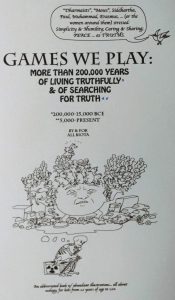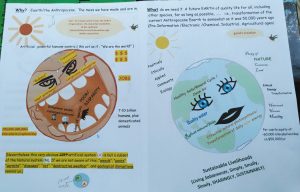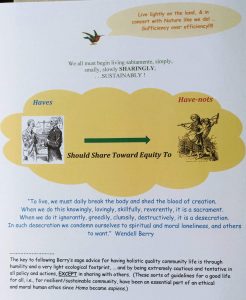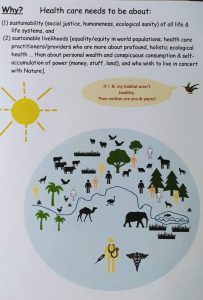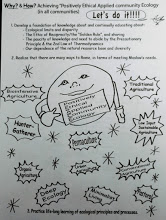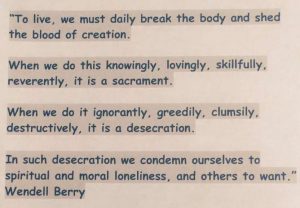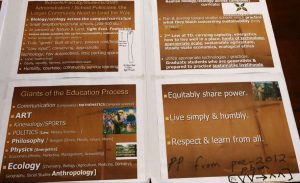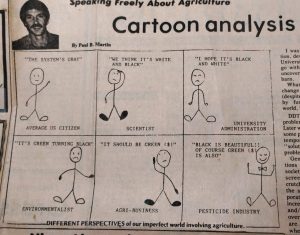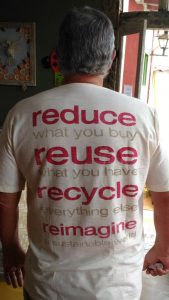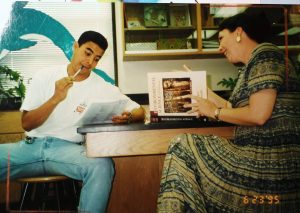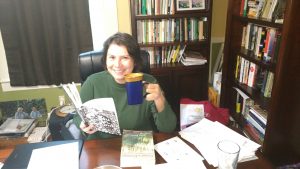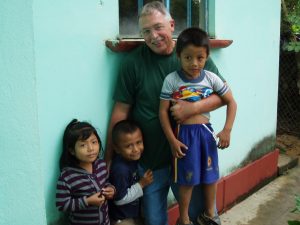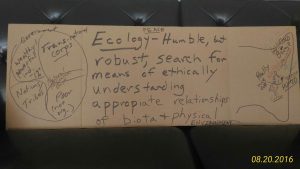A draft of an “Epilogue” to the little heavily illustrated book on applied ecology:
Up in the upper right-hand corner of the page, the little bird will ask:
“Why? don’t you humans practice what you preach?
… the Golden Rule … PEACE … Love … Humility.”
Epilogue: Major Contributors to This Book … and More on the Whys?, Whats?, and Hows? of Sustainable Ecological Community
……………………………………………
Joaquina Guevara, a Gen-Next, received her ecological ethos from her generalist and agitator of a mother, Laura Salazar, a Gen-X, and from a boarding school and at the liberal arts school of Wesleyan University in the northeastern U.S. Laura, whose mother was from Guanajuato, Mexico, became a woman of many ecological talents, including within the arts, in a hard-scrabble world in the barrios of Houston and San Antonio.
Elizabeth Florence (Hoffmann) and paul bain Martin’s lives began immediately after World War II in the baby boom of conventional capitalism and massive advertising propaganda, consumerism, and materialism. However, their parents, influenced greatly by the Great Depression and a simple rural ethic, were humble, cautious, and frugal, and demonstrated that life can be full of love, learning, and robust community interactions while being sabio, simple, small, slow, and sharing, i.e., relatively sustainable. Moreover, Catholic schoolings, teachings, and preachings reinforced in Betsy and paul a desired lifestyle of the seven Ss, … and the civil rights-, anti-War-, and holistic ecological health-movements of the 1960s and 70s expanded a personal desired ethos of showing compassion and respect for and empathizing and sharing with other humans and other species, i.e., an Ethic of Reciprocity.
Even though these four major collaborators on this book have always had trouble articulating and communicating eco-literacy and eco-values, and still do (as is the case with most folk), they do passionately believe that rather than seeking individual and tribal power, money, stuff, glamor, and arrogant satisfaction, …
1. We need to fervently and massively work toward reducing the individual and collective ecological footprints of the Haves (perhaps more than 0.5-1 billion humans, 2017) and living the Ss. (Reduction should be from about 150,000-300,000 kilocalories used /capita/day to about 60,000, or a reduction of about 2/3rds. In acres the ecological footprint in the U.S.A. should be reduced from about 20 global-acres/capita to 7. … Also, growth of human and domesticated animal population numbers needs to be reduced.
2. The power over the natural resource base (top soil & quality air, quality water, biodiversity, free available energy) needs to be shared and shifted toward the perhaps 3 billion (2017) Have-nots, and especially to the 1 billion in extreme poverty, and to other species (Ethic of Reciprocity).
3. Major actions and progress toward a peaceful, equitable, just, humane and ecologically sane world of the seven Ss would include:
• Realization of Positively Ethical Applied Community Ecology-PEACE across curricula and campuses of all human organizational entities. [All parents/adults should be tasked with learning about (with their children/other kids) … biology and PEACE.]
• Open borders (but with regulation and caution in realizing this to not have net harm to Have-nots and other species.)
• Setting aside one-half of Eaarth (with a goal of it becoming Earth again) to Nature. (Proposed by E.O. Wilson et al.; Wilson 2016 Half-Earth: Our Planet’s Fight for Life)
• Realizing appropriate applied agroecology* (as proposed by Dr. M.A. Altieri et al.; Altieri 1989 Agroecology: The Science of Sustainable Agriculture)
• Having a significant (critical) mass of humans from everywhere who would go to war zones, and actively, but peaceably!!/non-violently!, protest actions of War and the possession and use of armaments/weapons.
• Through legislation, regulations, protest, lobbying, and a dramatic change in buying habits, force corporations and other primary manufacturers, processors, and packaging to appropriately deal with all negative externalities like pollution, trash, waste; loss of biodiversity; and resistance to antibiotics.
For the most part, the major collaborators in developing this little applied ecology book do not think many of the currently in-vogue “sustainable” practices (or ones proposed to be “the answer”), such as biochar or application of sea weed solutions, or high input systems of photovoltaics, electric or smart-hybrid cars, hydroponics, conventional organic food production, urban agriculture, or other high input/throughput systems … are moving us much toward ecological community resilience & sustainability. On the other hand what makes more sense in terms of quality life for all are: planned controlled rotational grazing/browsing for appropriately utilizing native grassland/savanna systems (and even for utilizing and managing vegetation within forests and urban areas); local low-input production of appropriate types of vegetables, grains, herbs, and fruits, and domesticated animals as well as honey production; passive solar designs of buildings; lowering consumption by individuals and populations; low-input & -throughput-/appropriate-technology; and the development of small schools holistically integrated with the Land/Nature and with ecology across the curricula and campuses.
Moreover, if any of us are truly going to be of help as Elders–or Masters of anything, we must be first be generalists/master naturalists/positively ethical applied community ecologists. Our goal and process of conservation and development of sustainable ecological community should be primarily reliant on inputs from the local community and not dependent on grants, fossil/mined energy, and materials from outside (especially including plastics). As much as possible, the systems we develop as wise ones should be relatively closed with regard to energy flux and material flow, and should be mostly utilizing local solar energy received daily.
There are several major reasons that development of low input regeneration and conservation of resilient, sustainable ecological community is largely ignored in South Central Texas and other parts of the world:
1. Our socio-political/economic systems emphasize an artificially-built environment, mechanization, and instant gratification, which results in destroying Nature and natural cycles and processes. They reward quantity over quality which results in an increasing accumulation of unnecessary material goods which are not conducive to healthy life for all (including other species). They do not reward ecological soundness and resilience. … Moreover, they do not adequately reward social justice and humaneness.
2. Our education systems do a very poor job in facilitating a development of knowledge of ecological principles and processes.
3. We do not critically think about:
• Why Nature and the natural, and sense of ecological community and place, are necessary;
• The fact that a high rate of local and global energy transformation is harmful to quality life;
• What quality life means as individuals and in community (locally and globally, and including other species); and
• How we will effect effective change toward sustainable community.
[Other reasons are discussed in: http://bannedbookscafe.blogspot.com/2013/09/normal-0-false-false-false.html .]
Therefore, we cannot and will not sit down at a common table and begin to communicate about what quality life means and how we might go about realizing it, i.e., what our local and global community goals are and what are the objectives, action items, and assessment tools for realizing these.
Nevertheless, in this little book we did try to fight the current which is destroying a healthy Earth of vibrant biodiversity and humane humanity and to:
• make a case for Why? We must live sustainably, or through a hard-fought process of social justice, humaneness, and ecological sanity,
• point out What? we need to do to realize resilient, sustainable ecological community, and
• suggest How? we can realize the process and the Whats.
We hope this book will be helpful toward realizing:
• the seven Ss, or living Sabiamente/Wisely, Simply, Smally, Slowly, Steadfastly, Sharingly, SUSTAINABLY,
• a process of Positively Ethical Applied Community Ecology/PEACE,
• regeneration and conservation of resilient, sustainable community,
• transformation of Eaarth back toward being more of an Earth, and
• a healthier world for all for as long as possible.
pbm
[ 7 Ss / VV->^^ ]
****************************************************************************
[Various illustrations will be inserted within the text.]
